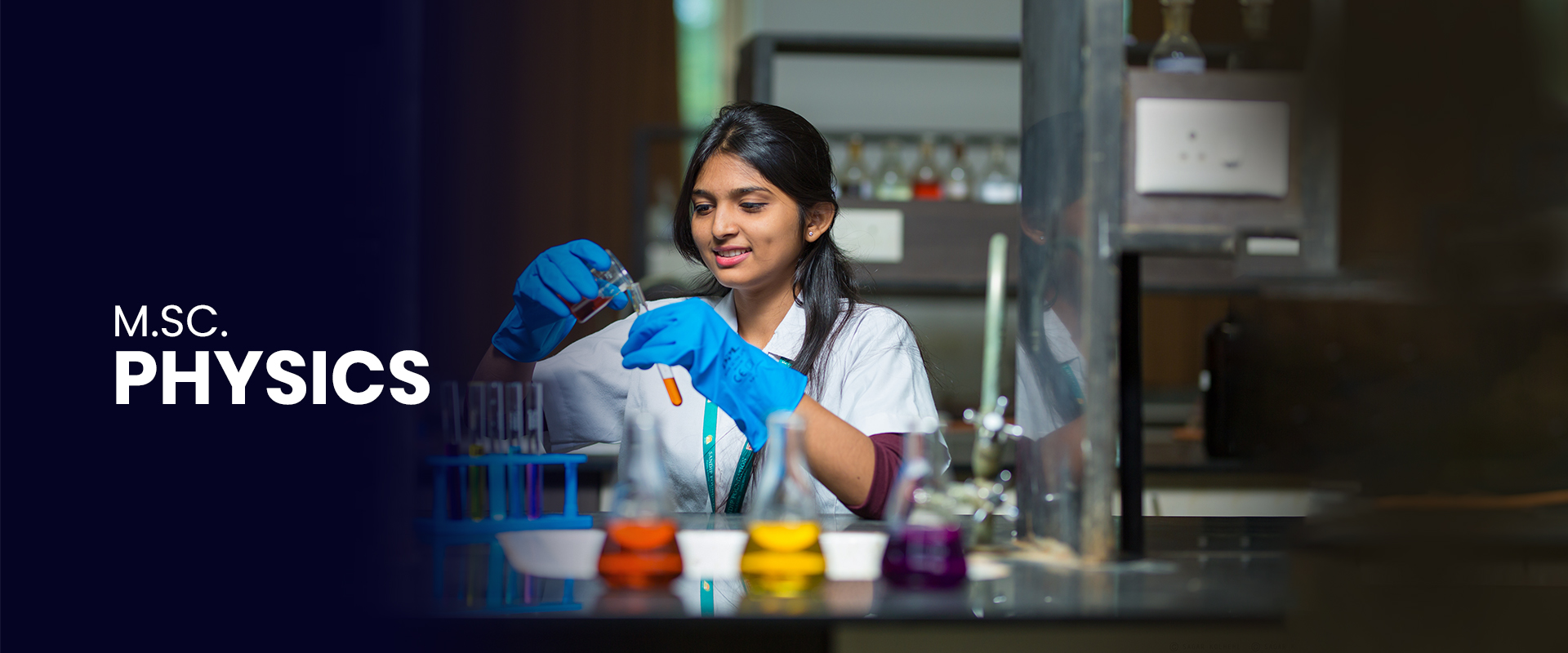Apply Now
About M.Sc. (Physics)
Career Opportunities in M.Sc. (Physics)

Research Scientist
Research scientists conduct relevant research to prove or dispute theories related to physics, making noteworthy contributions to the field of physics.

Medical Physicist
Medical physicists are professionals who assist medical staff such as doctors or nurses to diagnose illnesses in patients, and offer relevant treatments, when possible.

Radiation Physicist
Radiation physicists are employed in pathology labs and hospitals to ensure that devices that use radiation are functioning smoothly and accurately.

Research Associate
Research associates work closely with research scientists and are a part of a team or research project to carry out necessary research in the field of physics.
Fee Structure & Eligibility
| Programme | Sem | Year | Mode | Eligibility | Academic Fees Per Year (INR) |
Special Fees (Incl. Library Fee & Examination Fees) Per Year (INR) |
Fees Per Year |
|---|---|---|---|---|---|---|---|
SCHOOL OF SCIENCE (PG) |
|||||||
| M.Sc. Physics | 4 | 2 | Sem |
|
Rs. 12,000 /- | Rs. 7,000 /- | Rs. 19,000/- |
Note:
- Admission Form and Prospectus Rs. 1000/- (One Time).
- Caution Money Rs. 1000/-
- Hostel Fees Rs. 1,10,000/- per annum + 5000 (Deposit Rs 5, 000 at the time of Admission only on refundable basis) Minimum 4 Occupancy
- Transportation Fees as applicable based on Route and Pick Up Point.
- Uniform Cost Rs. 6000/-
Achievements
PEO,PO,PSO,CO
Program Educational Objective (PEOs)
|
PEO 1 |
To apply graduate-level knowledge and solve problems in the areas of physical sciences. |
| PEO 2 | An ability to conduct and/or demonstrate and/or design the experiment as well as to analyze and interpret the data |
| PEO 3 | An ability to function on multidisciplinary areas through the selection of advanced electives. |
| PEO 4 | An ability to pursue research and achieve career goals. |
Programme Outcome (POs)
| PO 1 |
Engineering Knowledge Apply the knowledge of mathematics, science, engineering fundamentals, and an engineering specialization to the solution of complex engineering problems. |
| PO 2 |
Problem Analysis Identify, formulate, review research literature, and analyse complex engineering problems reaching substantiated conclusions using first principles of mathematics, natural sciences and engineering sciences. |
| PO 3 |
Design /Development of Solutions Design solutions for complex engineering problems and design system components or processes that meet the specified needs with appropriate consideration for the public health and safety, and the cultural, societal, and environmental considerations |
| PO 4 |
Conduct Investigations of Complex Problems Use research-based knowledge and research methods including design of experiments, analysis and interpretation of data, and synthesis of the information to provide valid conclusions for complex problems. |
| PO 5 |
Modern Tool UsageCreate, select, and apply appropriate techniques, resources, and modern engineering and IT tools including prediction and modelling to complex engineering activities with an understanding of the limitations. |
| PO 6 |
The Engineer and Society Apply reasoning informed by the contextual knowledge to assess societal, health, safety, legal and cultural issues and the consequent responsibilities relevant to the professional engineering practice. |
| PO 7 |
Environment and Sustainability Understand the impact of the professional engineering solutions in societal and environmental contexts, and demonstrate the knowledge of, and need for sustainable development. |
| PO 8 |
Ethics Apply ethical principles and commit to professional ethics and responsibilities and norms of the engineering practice. |
| PO 9 |
Individual and Team Work Function effectively as an individual, and as a member or leader in diverse teams, and in multidisciplinary settings. |
| PO 10 |
Communication Communicate effectively on complex engineering activities with the engineering community and with society at large, such as, being able to comprehend and write effective reports and design documentation, make effective presentations, and give and receive clear instructions. |
| PO 11 |
Project Management and Finance Demonstrate knowledge and understanding of the engineering and management principles and apply these to one’s own work, as a member and leader in a team, to manage projects and in multidisciplinary environments. |
| PO 12 |
Life-long Learning –Recognize the need for, and have the preparation and ability to engage in independent and lifelong learning in the broadest context of technological change. |
Programme Specific Outcome (PSO)
| PSO1 | To apply graduate-level knowledge and solve problems in the areas of electrodynamics, quantum mechanics, classical mechanics, statistical mechanics, mathematical physics and nanoscience and nanotechnology. |
| PSO2 | Able to associate the learning from the softwares viz. Scilab, VESTA, Origin related to understand and interpret the data related to the physical sciences. |
| PSO3 | Apply experimental techniques (chemical bath deposition, SILAR, dip coating, spin coating) to synthesize thin films and nanomaterials |
| PSO4 | To provide a systematic understanding of the concepts and theories of mathematics and analyze the situations. |















